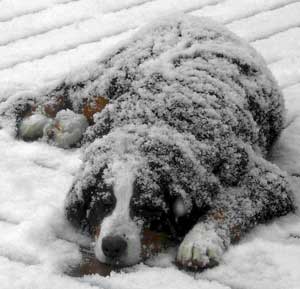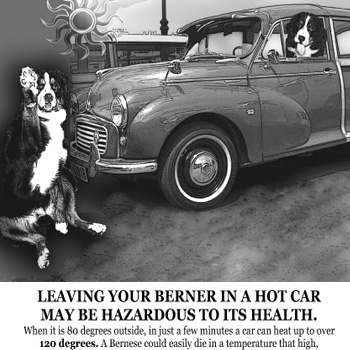Climate & Bernese Mountain Dogs
 Berners are big, heavily built dogs with black, thick, double coats. The breed was developed by the Swiss to live in the Alps where temperatures rarely reach 75°, even in the hottest months. Most Bernese Mountain Dogs love cold weather and snow. The dogs' black coats absorb heat from the sun; many dogs seek shade, even on cool days. It is not uncommon for Bernese to be less energetic and active in hotter months. Most Bernese seek out the coolest resting spot they can find in hot weather.
Berners are big, heavily built dogs with black, thick, double coats. The breed was developed by the Swiss to live in the Alps where temperatures rarely reach 75°, even in the hottest months. Most Bernese Mountain Dogs love cold weather and snow. The dogs' black coats absorb heat from the sun; many dogs seek shade, even on cool days. It is not uncommon for Bernese to be less energetic and active in hotter months. Most Bernese seek out the coolest resting spot they can find in hot weather.
Berners are heat intolerant - some more so than others.
A question frequently asked by those unfamiliar with Bernese Mountain Dogs is, "How do Berners handle heat?"
Puppy buyers and novice Bernese owners who live in climates where hotter temperatures are the norm (southern states in the US) should be aware warmer weather presents management challenges. Berners do best in a climate-controlled environment during hot weather. Berners require daily exercise regardless of the climate in which they live. In hot weather providing Berners with opportunities to exercise during cooler times of the day is the best choice to reduce the extra stress dogs endure when physical exertion and hot/humid weather are combined.
Tips for MANAGEMENT of BERNERS IN HOT WEATHER
► Keep water available at all times.
► Provide your Berner with access to an air conditioned room, or a cool basement and flooring without rugs.
► Fans can help a Berner to stay cool on hot days.
► If you must leave you dog outside during a hot or humid day, be sure it has plenty of shade and fresh water.
► If traveling with your Berner on warm/hot days, do not leave your dog unattended in your vehicle. And take water with you if you plan a long trip that includes your dog.
► If you plan an outing on a hot day, and are unsure your destination will have trees or structures that provide shade, bring a sheet or tarp, and bungy cords or clamps to provide a shaded area for your dog.
Many owners like to include their Berner in their family's vacation plans. Vacation destinations may be in warm climates. 'Show' dog owners take their dogs to dog shows located in a warm climates. Be sure to consider whether your dog will be comfortable and welcome - especially if climate conditions vary significantly from where your dog spends most of the year. Be aware - dogs unaccustomed to living in high temperatures (in excess of 75°) are at a greater risk for overheating than those who live in a hot climate.
Berner unattended in a car
on a hot day - a recipe for tragedy.
If you own a Bernese Mountain Dog and plan to keep your dog in a warm weather climate or expose your dog to days in which temperatures exceed 75°, it is important for you to recognize the signs of heat exhaustion and heat stroke. EXTREME HEAT CAN AND DOES KILL BERNESE MOUNTAIN DOGS.
HEAT EXHAUSTION - Signs/Symptoms
► Fatigue
► Circulatory collapse
► Red mucous membrane (gums)
► Excessive panting
► Dehydration
► Shaking
Treatment
· Seek shade, rest the dog, offer small amounts of water. Seek veterinary care if the dog's condition does not improve.
HEAT STROKE - Signs/Symptoms
► Excessive panting
► Rectal temperature above 105-106° (F)
► Disorientation
► Weakness
► Rapid pulse/breathing
► Brick red mucous membranes
Treatment
· Get the dog into shade, into a cool water (creek, pond) if available.
· Use same precautions as with human, don't use ice water bath.
· Slowly cool down the body temperature, immerse in a cool water bath.
· Ice can be placed, with caution, under armpits, head, neck, and groin area, being sure to wrap in cloth first.
· Monitor the dog's temperature, avoiding cooling too much.
· Transport to veterinary hospital.
Tip for puppy and senior Berner management in hot or cold Temperatures
► Young puppies and geriatric dogs should be monitored in temperature extremes (hot or cold) since their ability to regulate their body temperature is less than that of a mature healthy Bernese.